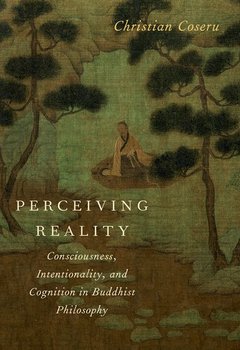Description
Perceiving Reality
Consciousness, Intentionality, and Cognition in Buddhist Philosophy
Author: Coseru Christian
Language: English
Perceiving Reality
Publication date: 07-2015
Support: Print on demand
Publication date: 07-2015
Support: Print on demand
Perceiving reality: consciousness, intentionality, and cognition in buddhist philosophy (hardback)
Publication date: 10-2012
384 p. · 23.4x16.3 cm · Hardback
Publication date: 10-2012
384 p. · 23.4x16.3 cm · Hardback
Description
/li>Contents
/li>Biography
/li>
What turns the continuous flow of experience into perceptually distinct objects? Can our verbal descriptions unambiguously capture what it is like to see, hear, or feel? How might we reason about the testimony that perception alone discloses? Christian Coseru proposes a rigorous and highly original way to answer these questions by developing a framework for understanding perception as a mode of apprehension that is intentionally constituted, pragmatically oriented, and causally effective. By engaging with recent discussions in phenomenology and analytic philosophy of mind, but also by drawing on the work of Husserl and Merleau-Ponty, Coseru offers a sustained argument that Buddhist philosophers, in particular those who follow the tradition of inquiry initiated by Dign?ga and Dharmak?rti, have much to offer when it comes to explaining why epistemological disputes about the evidential role of perceptual experience cannot satisfactorily be resolved without taking into account the structure of our cognitive awareness. Perceiving Reality examines the function of perception and its relation to attention, language, and discursive thought, and provides new ways of conceptualizing the Buddhist defense of the reflexivity thesis of consciousness-namely, that each cognitive event is to be understood as involving a pre-reflective implicit awareness of its own occurrence. Coseru advances an innovative approach to Buddhist philosophy of mind in the form of phenomenological naturalism, and moves beyond comparative approaches to philosophy by emphasizing the continuity of concerns between Buddhist and Western philosophical accounts of the nature of perceptual content and the character of perceptual consciousness.
Abbreviations. Chapter 1: Introduction. Chapter 2: Methodological and Metatheoretical Considerations. 1. Doctrine and Argument. 2. Reason and Discourse Analysis. 3. Cognition as Enactive Transformation. 4. Phenomenological Epistemology and the Project of Naturalism. Chapter 3: Sensation and the Empirical Consciousness. 1. No-self and the Domains of Experience. 2. Two Dimensions of Mind: Consciousness as Discernment and Sentience. 3. Attention and Mental Proliferation. 4. Cognitive Awareness and Its Object. Chapter 4: Perception, Conception, and Language. 1. Shared Notions about Perceptual Knowledge. 2. Debating the Criteria for Reliable Cognition. 3. Cognitive Aspects and Linguistic Conventions. 4. Epistemology as Cognitive Event Theory. Chapter 5: An Encyclopaedic and Compassionate Setting for Buddhist Epistemology. 1. The Definition of Purpose: Dependent Arising and Compassion. 2. Mapping the Ontological and Epistemological Domains. 3. Perception and the Principle of Clarity. Chapter 6: Perception as an Epistemic Modality. 1. "Conception Free" as a condition of "Perceptual Knowledge". 2. Perception, Conception, and the Problem of Naming. 3. Cognitive Errors and Perceptual Illusions. Chapter 7: Foundationalism and the Phenomenology of Perception. 1. Intrinsic Ascertainment and the "Given". 2. Particulars and Phenomenal Objects. 3. Foundationalism and Its Malcontents. 4. Naturalism and Its Discontents. 5. Beyond Representation: An Enactive Perception Theory. Chapter 8: Perception, Self-Awareness, and Intentionality. 1. Reflexivity and the Aspectual Nature of Intentional Reference. 2. Knowledge, Phenomenal Objects, and the Cognitive Subconscious. 3. Phenomenology and the Intentionality of Perception. Chapter 9: In Defense of Epistemological Optimism. 1. A Moving Horizon. 2. Embodied Consciousness: Beyond "Seeing" and "Seeing As". 3. Epistemic Authority Without Manifest Truth. Bibliography.
Christian Coseru is Associate Professor of Philosophy in the Department of Philosophy at the College of Charleston
© 2024 LAVOISIER S.A.S.




